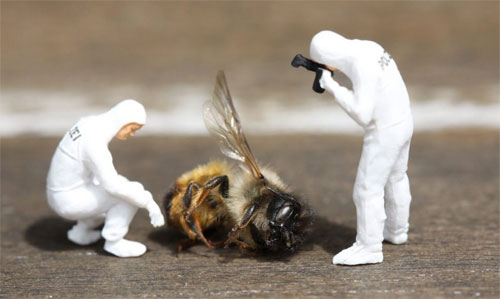France becomes the first European country to ban all pesticides associated with bee deaths
The world has recently awakened to yet another negative effect of excessive pesticide use. In several places, the population of the bees has been drastically coming down which significantly signifies impending doom.

Even after realizing the perils, not all nations have taken remedial measures. Some have also decided to sanction newer chemicals that are expected to be even more disastrous in this regard. Nevertheless, France is not going to sit quietly.
The nation is on track to becoming the first European country to ban five varieties of pesticides. Researchers are convinced that those neonicotinoids are very harmful as they’re killing the bees.
In the wake of such a radical decision, there’ve been reactions from many sides. There is no doubt that bee-keepers and environmentalists are utterly elated at the decision. Nevertheless, sugar beet and cereal farmers aren’t very excited about it. They worry that the ban will make their crops vulnerable to other insects and pests.
Through the enforcement of this ban, France has moved beyond the clear boundaries set by the European Union. While the EU had outlawed only three neonicotinoids, the country went on to ban all five of them.
Furthermore, this ban is applicable not only in outdoor fields but within greenhouses too.
Britain had initially opposed this ban. Eventually, though they came around after more evidence surfaced supporting this. More so, after researchers found out that these pesticides cause the mysterious “colony collapse disaster” among bees in Europe and elsewhere.
In this phenomenon, big communities of bees suddenly die. Apart from the pesticides, this might also be caused by fungi, viruses, and mites.
Furthermore, the bees have been seen to get addicted to these harmful pesticides; just like we’re addicted to nicotine or other similar substances.
Those synthetic neonicotinoids have a similar structure to nicotine. Since their introduction in the mid-90s, those chemicals have been attacking the insects’ central nervous systems.
This category of pesticides is currently the most commonly used variant. Those were seen as replacements for the other, more harmful, pesticides used in the past. They’re mostly used in treating fruit trees, vineyards, beets, and other flowering plants.
Nevertheless, according to many studies, these chemicals mess with the sperm count of the male bees. They also cause severe disorientation of the bees’ memory and their ability to return home. Furthermore, the fact remains that the bees are addicted to the mixed pesticide nectar. As a result, they don’t naturally stay away from those.
In this context, several angry French farmers have vehemently argued against that ban. They feel that there is a lack of substantial evidence to connect the pesticides with the decline in the bee population.
FNSEA, the biggest farming union in France, has called for an exemption of this ban in cases where there’s no adequate alternative. They have also pointed out that such a ban would lead to unfair competition between producers from Europe and those from elsewhere.
Contrary to the claims of the farming unions members, the French public health agency, ANSES, claimed otherwise. In their opinion, quite a few sustainable and efficient alternatives are already operational in France.
yogaesoteric
October 13, 2019
